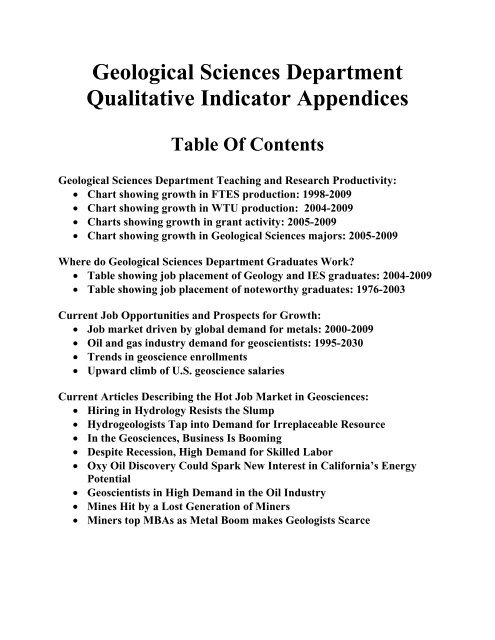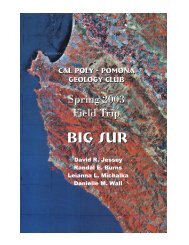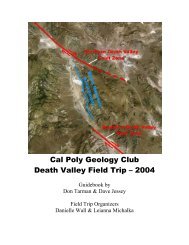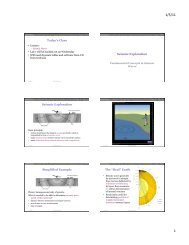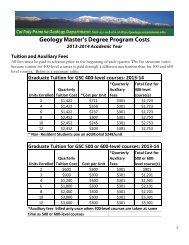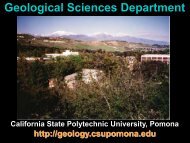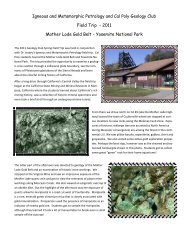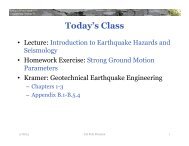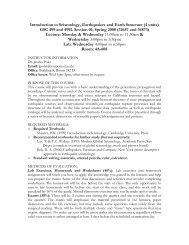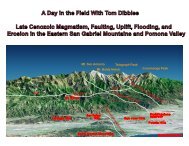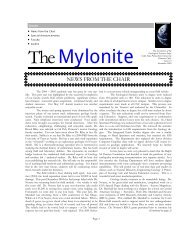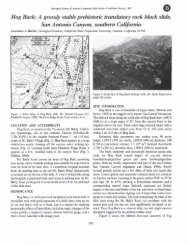Appendices to Qualitative Program Indicators - Geological Sciences ...
Appendices to Qualitative Program Indicators - Geological Sciences ...
Appendices to Qualitative Program Indicators - Geological Sciences ...
Create successful ePaper yourself
Turn your PDF publications into a flip-book with our unique Google optimized e-Paper software.
<strong>Geological</strong> <strong>Sciences</strong> Department<br />
<strong>Qualitative</strong> Indica<strong>to</strong>r <strong>Appendices</strong><br />
Table Of Contents<br />
<strong>Geological</strong> <strong>Sciences</strong> Department Teaching and Research Productivity:<br />
Chart showing growth in FTES production: 1998-2009<br />
Chart showing growth in WTU production: 2004-2009<br />
Charts showing growth in grant activity: 2005-2009<br />
Chart showing growth in <strong>Geological</strong> <strong>Sciences</strong> majors: 2005-2009<br />
Where do <strong>Geological</strong> <strong>Sciences</strong> Department Graduates Work<br />
Table showing job placement of Geology and IES graduates: 2004-2009<br />
Table showing job placement of noteworthy graduates: 1976-2003<br />
Current Job Opportunities and Prospects for Growth:<br />
Job market driven by global demand for metals: 2000-2009<br />
Oil and gas industry demand for geoscientists: 1995-2030<br />
Trends in geoscience enrollments<br />
Upward climb of U.S. geoscience salaries<br />
Current Articles Describing the Hot Job Market in Geosciences:<br />
Hiring in Hydrology Resists the Slump<br />
Hydrogeologists Tap in<strong>to</strong> Demand for Irreplaceable Resource<br />
In the Geosciences, Business Is Booming<br />
Despite Recession, High Demand for Skilled Labor<br />
Oxy Oil Discovery Could Spark New Interest in California’s Energy<br />
Potential<br />
Geoscientists in High Demand in the Oil Industry<br />
Mines Hit by a Lost Generation of Miners<br />
Miners <strong>to</strong>p MBAs as Metal Boom makes Geologists Scarce
<strong>Geological</strong> <strong>Sciences</strong> Department Teaching Productivity
<strong>Geological</strong> <strong>Sciences</strong> Department Grant Activity 2005-10
Number of <strong>Geological</strong> <strong>Sciences</strong> Majors: 2004-09<br />
50<br />
Total Number of Geology and IES Majors<br />
45<br />
40<br />
35<br />
30<br />
25<br />
20<br />
15<br />
10<br />
5<br />
0<br />
Fall, 2004 Fall, 2005 Fall, 2006 Fall, 2007 Fall, 2008 Fall, 2009<br />
Autumn Indica<strong>to</strong>r
Placement of <strong>Geological</strong> <strong>Sciences</strong> Department Graduates<br />
Past Six Years:<br />
Name<br />
Year<br />
Graduated Quarter Degree Earned Type of Employment Company or School Location Position(s) held; etc.<br />
Reynicole Gilbert 2009 Spring Geology Graduate School University of Leeds United Kingdom candidate for PhD in engineering Geology<br />
Jose Pena-Cortez 2009 Spring Integrated Earth Studies Geotechnical Industry<br />
Lauren Carey 2009 Spring Integrated Earth Studies & Geology Graduate Student University of Idaho Moscow, ID Candidate for PhD in hydrology<br />
Matt Willis 2009 Spring Integrated Earth Studies<br />
Ames Research Assistant;<br />
Graduate Student Cal Poly Pomona Pomona, CA Graduate Student in Regenerative Studies<br />
Kim Poste 2009 Winter Integrated Earth Studies Environmental Remediation Orange County Water District Fountain Valley, CA<br />
Peter Piestrzeniewicz 2009 Winter Geology <br />
Daniel Hea<strong>to</strong>n 2008 Spring Geology Graduate Student San Diego State University San Diego, CA Candidate for Masters in geochemistry<br />
Allison Ruo<strong>to</strong>lo 2008 Spring Geology Geotechnical Industry<br />
Kayla Kroll 2008 Spring Geology<br />
Geotechnical Industry; Graduate<br />
Student<br />
ETIC Engineering; UC Riverside<br />
Pasadena, CA; Riverside,<br />
CA<br />
Entry-level Geologist; Candidate for Masters in<br />
Geology<br />
Travis Avant 2008 Fall Geology Graduate Student New Mexico State University Las Cruces, NM Candidate for Masters in geology<br />
Azad Khalighi 2008 Fall Geology Geotechnical Industry ETIC Engineering Pasadena, CA Entry-level Geologist<br />
Rancho Cucamonga, CA;<br />
Reginald Agunwah 2008 Fall Geology Environmental Remediation URS Corporation; Cahuilla Indian Tribe Ramona, CA<br />
<strong>Geological</strong> technician; Environmental manager<br />
Robert Ellis 2008 Summer Integrated Earth Studies & Geology Graduate Student UC Riverside Riverside, CA Candidate for Masters in geology<br />
Julie Brown 2008 Summer Geology Graduate Student University of Nevada, Reno Reno, NV Candidate for Masters in geology<br />
Kimberly Craig 2007 Spring Integrated Earth Studies Earth Science Education High School<br />
Matthew Lusk 2007 Spring Geology<br />
Graduate Student; Petroleum<br />
Industry University of Wyoming; Exxon-Mobile Laramie, WY; Hous<strong>to</strong>n TX<br />
Earned Masters in Geology, 2009; currently entry level<br />
geoscientist<br />
Danielle Wall 2007 Winter Geology <br />
Eli LaFromboise 2007 Winter Geology Graduate Student CSU Northridge Northridge, CA Candidate for Masters in geology<br />
Eathan McIntyre 2007 Fall Geology Hydrogeology Industry Orange County Water District Fountain Valley, CA lost <strong>to</strong>uch after leaving OCWD<br />
Jessica Strand 2006 Spring Integrated Earth Studies & Geology Hydrogeology Industry GSI Water Pasadena, CA Entyry-level hydrogeoloist<br />
Cade Klock 2006 Spring Integrated Earth Studies Geotechnical Industry<br />
Ashley Varnell 2006 Spring Geology Geotechnical Industry<br />
Julie Parra 2006 Spring Geology Graduate Student CSU Northridge Northridge, CA Candidate for Masters in geology<br />
Pablo Cortez 2006 Spring Geology Geotechnical Industry Stantec Consulting Corporation Irvine, CA <strong>Geological</strong> technician<br />
Shaun Wilkins 2006 Winter Geology Geotechnical Industry GeoSoils, Inc. Anaheim, CA <strong>Geological</strong> technician<br />
Robert E. Jones 2005 Spring Integrated Earth Studies Graduate Student CSU Fuller<strong>to</strong>n Fuller<strong>to</strong>n CA Environmental <strong>Sciences</strong> Masters program<br />
Ann M. Gamboa 2005 Spring Integrated Earth Studies <br />
Cami Jo Anderson 2005 Winter Geology <br />
Randal Burns 2006 Fall Geology Mineral Resource Industry Robinson Mine, Nevada<br />
Terri Satterfield 2006 Fall Integrated Earth Studies Hydrogeology Industry Inland Empire Utilities Agency Chino, CA<br />
Lawrence Browne 2004 Fall Geology Geotechnical Industry Arcadis U. S. Inc. Fuller<strong>to</strong>n, CA Project Scientist<br />
Jose DeLoera 2004 Integrated Earth Studies Geotechnical Industry<br />
URS Corporation;Insight Environmental,<br />
Engineering and Construction, Inc<br />
Ranco Cucamonga, CA;<br />
Anaheim, CA<br />
Project Geologist<br />
Chris Horsley 2004 Geology Earth Science Education Chino High School Chino, CA Science Teacher<br />
Marlen Quintana pre-2004 Integrated Earth Studies Earth Science Education High School Science Teacher<br />
Juan Navarro pre-2004 Integrated Earth Studies Environmental Remediation Air Quality Management Agency Environmental technician<br />
Noteworthy Alumni From Earlier Years:<br />
Name<br />
Year<br />
Graduated Quarter Type of Employment Company or School Location Position(s) held; etc.<br />
J. David Rogers 1976 Earth Science Education University of Missouri, Rolla Rolla, MO Chair, Dept of <strong>Geological</strong> Engineering<br />
Steve Carpenter 1977 Mineral Resource Industry Rio Tin<strong>to</strong> Sparks, NV Project Geologist<br />
Matt Schumaker 1978 Mineral Resource Industry Bureau of Land Management Phoenix, AZ Senior Geologist, Mining Law Training Coordina<strong>to</strong>r<br />
Gary Wallace 1978 Geotechnical Industry RMA Group Rancho Cucamonga, CA Chief Geologist<br />
Doug Cook 1978 Geotechnical Industry RMA Group<br />
Steve Mulqueen 1978 Mineral Resource Industry CA Dept of Conservation Mine safety inspec<strong>to</strong>r<br />
Jeffrey Eppink 1979<br />
Geotechnical Industry; focus on<br />
Carbon Sequestration Energis LLC Fairfax, VA President<br />
Steve Zuker 1981 Mineral Resource Industry Esperanza Silver Corporation Denver, CO Vice President of Exploration<br />
Scott McKeag 1982 Geotechnical Industry McGinley and Associates Las Vegas, NV Chief Engineering Manager<br />
Project Geologist; Learning and Development<br />
Peter Valles 1983 Petroleum Industry Shell Oil Company Hous<strong>to</strong>n, TX<br />
Manager
Thom Deane 1983<br />
Water Resources and<br />
Environmental Consulting Deane Consulting, Inc. President and Senior Consulting Geologist<br />
Doris Reilly 1986 Hydrogeology Industry Orange County Water District Fountain Valley, CA Hydrogeologist<br />
Marina West 1988 Hydrogeology Industry<br />
Orange County Water District; Joshua<br />
Basin Water district Joshua Tree, CA Supervising Hydrogeologist and Manager<br />
Mathew Chuang 1988 Hydrogeology Industry Metropoletan Water District Hydrological Engineer<br />
David Thompson 1988 Geotechnical Industry Arroyo geotech<br />
Mike Base 1988 Mineral Resource Industry Mineral Miners.com Site-Geologists<br />
Andy Campbell 1989 Hydrogeology Industry Inland Empire Utilities Agency Chino, CA<br />
Geoscience Support Sevices; Thomas<br />
Harder Groundwater Consulting<br />
Senior Hydrogeologist; President and founder of<br />
successful startup company<br />
Tom Harder 1990 Hydrogeology Industry<br />
southern CA<br />
Hydrogeology and Geotechnical<br />
Tom Hibner 1990<br />
Industry Metropolitan Water District Engineering Geologist<br />
Nancy LaMascus 1990 Hydrogeology Industry State of Arizona<br />
Resource<br />
Robert Ruscit<strong>to</strong>, Jr. 1991<br />
Management/Groundwater ARCADIS Geraghty & Miller, Inc. Fountain Valley, CA Treasurer<br />
Steve La Mascus 1991 Airline Industry Captain, Mesa Airlines<br />
Kevin Rosso 1992 Environmental Remediation Battelle Labs Richland,WA Geochemist/Environmental Engineer<br />
Rodney Crother 1992 Geotechnical Industry Stantec Corporation Senior Geologist<br />
Michelle Zych 1992 Environmental Remediation Camp Dresser McKee<br />
Jim Culotta 1993 Information Technology Netcom<br />
John Reilly 1994 Hydrogeology Industry Orange County Water District Fountain Valley, CA Hydrogeologist<br />
David Hankins 1994 Geotechnical Industry ATC Associates<br />
Melissa Pratt 1995 Environmental Remediation State of Wyoming Lander, WY Environmental inspec<strong>to</strong>r of mines<br />
Phil Hor<strong>to</strong>n 1995 Quality Dental Products DENOVO Dental Inc. Baldwin Park, CA Internet Cus<strong>to</strong>mer Services<br />
Russel Kyle 1996 Hydrogeology Industry Geoscience Support Services Claremont, CA Project manager<br />
Charlene Drake 1996 Environmental Remediation Birge Inc.<br />
Brent Norum 1997 Computer Technology Cal Poly Pomona Pomona, CA Senior IT technician<br />
Glen Kinoshita 1997 grad student SDSU San Diego, CA<br />
Matthew Chuang 1998 Hydrogeology Industry Metropolitan Water District La Verne, CA Engineer and hydrogeologist<br />
Gary Patt 1998 Military Defense Central Intelligence Agency Remote-Sensing Terrain Analysis<br />
Cathy Sanford 1998 Geotechnical Industry Stantec Corporation Irvine, CA staff geologist<br />
Sara Moran 1999 <br />
Lisa Rands 1999 Professional Rock climber<br />
Morty Price 1999 Geotechnical Industry City of LA<br />
Van Vathanasin, PG 1999 Geotechnical Industry MWH Americas, Inc. Arcadia,CA<br />
Jeremy Lancaster 2000 Geologic Hazards Assessment California <strong>Geological</strong> Survey Los Angeles, CA Geologist<br />
Andrew McLarty 2000 Geotechnical Industry KFM Geoscience project geologist<br />
Cathy Chavez 2000 Environmental Remediation Dept. of Toxic Substances Control Glendale, CA Hazardous Substances Scientist<br />
Mike Yamzon 2000 Military Defense Vandenburg Air Force Base<br />
Darrin Hasham 2001 Geotechnical Industry Kleinfelder, Inc. Diamond Bar, CA staff geologist<br />
Juan Navarro 2001 Environmental Remediation Air Quality Management Agency Environmental technician<br />
Marc Rosser 2001 Earth Science Education Science Teacher<br />
Anthony Scalese 2002 Earth Science Education CJU High School Science Teacher<br />
Susan Perez 2002 Earth Science Education LAUSD<br />
Jeff DeLand 2003 Geotechnical Industry Leigh<strong>to</strong>n Group, Inc. Temecula, CA staff geologist<br />
Terry Watkins, Jr. 2003 Hydrogeology Industry Geoscience Support Services Claremont, CA Hydrogeologist<br />
Meredith Staley 2003<br />
Paleon<strong>to</strong>logy--archeology site<br />
investigation<br />
Natural His<strong>to</strong>ry Museum of Los Angeles<br />
County/LSA Riverside, CA Vertebrate Paleon<strong>to</strong>logist, Lab Direc<strong>to</strong>r, Prepara<strong>to</strong>r<br />
Terri Burgess (Amborn) 2003 Earth Science Education Orange Grove Middle School Hacienda Heights, CA Science Teacher<br />
Kerry Ca<strong>to</strong> Friend Geotechnical Industry Ka<strong>to</strong> Geoscience, Inc. Temecula, CA President and company founder<br />
Miguel Espinoza 2005<br />
Needs two chemistry courses <strong>to</strong><br />
graduate in Geology Geotechnical Industry MacTech Engineering Corporation Los Angeles, CA Staff Geologist II/Deputy Grading Inspec<strong>to</strong>r<br />
Rogan Jones 1994<br />
Completed senior thesis in Geology but<br />
graduated from Western Washing<strong>to</strong>n<br />
University Information Technology Affordable Information Bellingham, WA<br />
Database /Software Development SQL, ORACLE,<br />
ASP, VB, Access, .NET, etc.<br />
Steve Konig 1992<br />
Graduated Mechanical Engineering from<br />
Cal Poly; <strong>to</strong>ok several Geology courses<br />
Oil & Energy<br />
US Pipelines & Logisitcs (Nor<br />
Cal/PNW) at BP Sacramen<strong>to</strong>, CA Operations Manager<br />
Cynthia Gabaldon 1991 CE major <strong>to</strong>ok several Geology courses Geotechnical Industry URS Corporation Rancho Cucamonga, CA Senior Engineer<br />
Ruben Acosta 1998<br />
Did not graduate; needs a couple<br />
physics and math courses Construction Management PCM Construction Co. oversees construction of schools<br />
Aelco Wolf 1992<br />
Took Groundwater geology and other<br />
courses at Cal Poly Hydrogeology Industry Geoscience Support Services Claremont, CA Hydrogeologist
10-year trends in global metals prices are an excellent indica<strong>to</strong>r of the vitality<br />
and future of the mineral exploration industry which employs geologists,<br />
geophysicists, engineers and hydrologists. As of Oc<strong>to</strong>ber, 2009, the mining<br />
industry is already rebounding from the 2008 global economic crisis:<br />
Industrial metals play a critical role in the global economy and provide fundamental raw<br />
materials for manufacturing and construction. Metals are all around us and contribute <strong>to</strong><br />
our elevated standard of living. Consider the importance of metals in electricity<br />
transmission, buildings, freeways, culverts, water and petroleum pipelines, electronics<br />
components, drilling hardware, and the aerospace industry. Emerging “green”<br />
technologies, e.g., windmills, turbines, solar collec<strong>to</strong>rs, electric cars, batteries, mass transit<br />
systems, catalytic converters and fac<strong>to</strong>ry emission “scrubbers” require special metals or<br />
metal alloys for their viability. 21 st century humanity is confronted with basic truths:<br />
1. Metals are extracted (mined) from the ground where they have been concentrated by<br />
special geologic processes, 2. Global metal production is tapering off because existing<br />
mines developed during the last mining boom of 1970-85 have not been replenished by<br />
new mineral discoveries, and 3. Significant mineral exploration and subsequent mine<br />
development are needed <strong>to</strong> sustain future global demand for metals.<br />
Hence, future job prospects are excellent for mineral exploration geoscientists.
American <strong>Geological</strong> Institute<br />
GEOSCIENCE CURRENTS<br />
Geoscience Enrollments Jump Sharply in 2008-2009<br />
No. 23<br />
22 June 2009<br />
The 2008-2009 academic year saw a sharp 8% increase in the number of geosciences undergraduates enrolled in U.S.<br />
institutions, <strong>to</strong> a <strong>to</strong>tal population of 22,191. This trend was not evident in graduate enrollments, which remained<br />
basically flat at 7846 students. These trends reflect statements from departments about sudden increases in undergraduates<br />
because of the increased interest in energy and environmental issues. As constrained budgets have limited<br />
the number of funded graduate positions, enrollment remains steady but admission has become more competitive.<br />
40000<br />
US Geoscience Enrollments, 1955-2009<br />
35000<br />
Students<br />
30000<br />
25000<br />
20000<br />
Undergraduate<br />
15000<br />
10000<br />
5000<br />
Graduate<br />
0<br />
1955<br />
1957<br />
1959<br />
1961<br />
1963<br />
1965<br />
1967<br />
1969<br />
1971<br />
1973<br />
1975<br />
1977<br />
1979<br />
1981<br />
1983<br />
1985<br />
1987<br />
1989<br />
1991<br />
1993<br />
1995<br />
1997<br />
1999<br />
2001<br />
2003<br />
2005<br />
2007<br />
2009<br />
Year<br />
Source: AGI Geoscience Workforce <strong>Program</strong>, data derived from AGI’s Direc<strong>to</strong>ry of Geoscience Departments<br />
Degrees granted in the geosciences<br />
have remained steady, reflecting the<br />
enrollment numbers of the past several<br />
years. The recent influx of students will<br />
not likely be seen in degree production<br />
until the 2010-2011 academic year.<br />
Degrees Awarded<br />
8000<br />
7000<br />
6000<br />
5000<br />
4000<br />
3000<br />
US Geoscience Degrees Granted, 1973-2009<br />
Bachelor's<br />
2000<br />
1000<br />
0<br />
Doc<strong>to</strong>rate<br />
Master's<br />
www.agiweb.org/workforce/<br />
1973<br />
1975<br />
1977<br />
1979<br />
1981<br />
1983<br />
Year<br />
Source: AGI Geoscience Workforce <strong>Program</strong>, data derived from AGI’s Direc<strong>to</strong>ry of Geoscience Departments<br />
1985<br />
1987<br />
SERVING THE GEOSCIENCES WORLDWIDE<br />
GI ATHE AMERICAN GEOLOGICAL INSTITUTE<br />
1989<br />
1991<br />
1993<br />
1995<br />
1997<br />
1999<br />
2001<br />
2003<br />
2005<br />
- Chris<strong>to</strong>pher Keane<br />
workforce@agiweb.org<br />
2007<br />
2009
American <strong>Geological</strong> Institute<br />
GEOSCIENCE CURRENTS<br />
U.S. Geoscience Salaries Continue Upward Climb<br />
No. 24<br />
6 July 2009<br />
Salaries for all geoscience-related professions continue <strong>to</strong> exceed the national mean salary for all other science<br />
occupations in 2008. Petroleum engineering salaries averaged $119,400, and salaries for geoscientists (except<br />
hydrologists and geographers) averaged $89,300. Salaries for environmental scientists and specialists averaged<br />
$65,280, just $1,000 over the national average for other science occupations.<br />
$120,000<br />
$110,000<br />
Mean Annual Salaries of Geoscience Professions<br />
(1999-2008)<br />
Petroleum Engineers<br />
Atmospheric and Space Scientists<br />
Mean Annual Salary (USD)<br />
$100,000<br />
$90,000<br />
$80,000<br />
$70,000<br />
$60,000<br />
$50,000<br />
$40,000<br />
1999 2000 2001 2002 2003 2004 2005 2006 2007 2008<br />
Year<br />
Source: AGI Geoscience Workforce <strong>Program</strong>, data derived from the U.S. Bureau of Labor Statistics, National<br />
Occupational Employment and Wage Estimates, 1999-2008.<br />
Geographers<br />
Geoscientists<br />
(except Hydrologists and Geographers)<br />
Other Science Occupations<br />
Environmental Scientists and Specialists<br />
(including Health)<br />
Environmental Engineers<br />
Hydrologists<br />
Mining and <strong>Geological</strong> Engineers<br />
(including Mining Saftey Engineers)<br />
Petroleum engineering salaries, along with geoscientist<br />
salaries are strongly driven by the oil and gas industry.<br />
The growth in atmospheric and space science salaries<br />
tracks the increase in federal funding of atmospheric<br />
research. The increase in geographer salaries can be<br />
traced <strong>to</strong> the increased use of GIS technology in the<br />
private sec<strong>to</strong>r over the past five years.<br />
Percent Change<br />
30%<br />
25%<br />
20%<br />
15%<br />
10%<br />
5%<br />
Percent Change in Mean Annual Salary<br />
(1999-2008)<br />
27%<br />
19%<br />
17%<br />
13%<br />
9% 8%<br />
6%<br />
4%<br />
0.1%<br />
0%<br />
1999-2008<br />
Note: Salaries were adjusted for inflation and normalized <strong>to</strong> 2008 dollars.<br />
Source: AGI Geoscience Workforce <strong>Program</strong>, data derived from the U.S. Bureau of Labor Statistics,<br />
National Occupational Employment and Wage Estimates, 1999-2008.<br />
www.agiweb.org/workforce/<br />
SERVING THE GEOSCIENCES WORLDWIDE<br />
GI ATHE AMERICAN GEOLOGICAL INSTITUTE<br />
- Leila Gonzales<br />
workforce@agiweb.org
Fresh Starts - Hiring in Hydrology Resists the Slump - NYTimes.com<br />
http://www.nytimes.com/2009/03/08/jobs/08start.html_r=2&sq=water&st=cse&scp=8&pagewanted=print<br />
Page 1 of 3<br />
3/12/2009<br />
March 8, 2009<br />
FRESH STARTS<br />
Hiring in Hydrology Resists the Slump<br />
By EILENE ZIMMERMAN<br />
THE Earth may be two-thirds water, but only about 1 percent of that water is actually usable for human<br />
consumption and agriculture. What’s more, as the planet warms and the population shifts, even that 1<br />
percent is at risk.<br />
That is why demand for hydrologists has been predicted <strong>to</strong> grow 24 percent from 2006 <strong>to</strong> 2016, much faster<br />
than the average for all occupations, according <strong>to</strong> the Bureau of Labor Statistics.<br />
Hydrologists study the distribution, circulation and physical properties of water, with hydrogeologists<br />
focusing specifically on groundwater. (According <strong>to</strong> the United States <strong>Geological</strong> Survey, there is 100 times<br />
more water beneath the ground than there is in all the world’s lakes and rivers.)<br />
“Hydrologist is a fairly broad term, but generally, any research or problems having <strong>to</strong> do with water, there’s a<br />
hydrologist working on it,” said Matthew C. Larsen, a hydrologist and associate direc<strong>to</strong>r for water at the<br />
<strong>Geological</strong> Survey.<br />
Most hydrologists did not earn degrees in hydrology; in fact, only a handful of undergraduate and graduate<br />
hydrology programs exist across the country. It is far more common for hydrologists <strong>to</strong> come from a hardscience<br />
or engineering background. Though it is possible <strong>to</strong> enter the field with a bachelor’s degree — most<br />
often as a lab technician — moving up in the career requires an advanced degree, Mr. Larsen said.<br />
After creation of the Environmental Protection Agency in 1970 and passage of the Clean Air Act in 1977 and<br />
Superfund legislation in 1980, hydrologists’ work was largely focused on water quality. Today, however, “an<br />
increasing percentage of hydrologists are interested in water quantity and supply, which is an emerging issue<br />
and where global climate change plays a big role,” said Dork Sahagian, professor of earth and environmental<br />
science at Lehigh University and direc<strong>to</strong>r of its Environmental Initiative in Bethlehem, Pa.<br />
“But concern with water quality — which involves local, site-based issues — still drives the job market,” he<br />
said. “Most hydrologists in this part of the world are still hired <strong>to</strong> cope with the availability of clean water for<br />
drinking and municipal supplies.”<br />
Hydrologists use samples of water and soil, which they have traditionally collected themselves by wading out
Fresh Starts - Hiring in Hydrology Resists the Slump - NYTimes.com<br />
http://www.nytimes.com/2009/03/08/jobs/08start.html_r=2&sq=water&st=cse&scp=8&pagewanted=print<br />
Page 2 of 3<br />
3/12/2009<br />
in<strong>to</strong> a river or lake. Computers, however, have changed the nature of that field work. The <strong>Geological</strong> Survey<br />
now uses computerized samplers set up in rivers and streams throughout the nation.<br />
But some field work is still required, especially early in a hydrologist’s career, and is often considered a perk<br />
— the ability <strong>to</strong> work outdoors and in beautiful places. That work could involve inspecting a dam, drilling a<br />
well or measuring a river’s flow.<br />
“I used <strong>to</strong> say the worst day in the field still beat the best day in the office,” said Mark Wigmosta, a<br />
hydrologist with the Pacific Northwest National Labora<strong>to</strong>ry, an Energy Department research center in<br />
Richland, Wash. “I don’t spend as much time out in the field, and I miss it. My work now is primarily in front<br />
of a computer.”<br />
In fact, computers have revolutionized hydrology in ways beyond sampling. Data collected in the field is now<br />
plugged in<strong>to</strong> complex mathematic models that allow hydrologists <strong>to</strong> make predictions — for example, about<br />
the effect of climate change on sea levels. The models also help them develop recommendations for solving<br />
problems, like how much water can be diverted from a river <strong>to</strong> combat a drought.<br />
“People interested in hydrology often don’t understand you need <strong>to</strong> be very strong in math,” said Michael<br />
Boufadel, an engineer and hydrologist and the chairman of the civil and environmental engineering<br />
department at Temple University in Philadelphia.<br />
They also need <strong>to</strong> communicate well, because their research is often written in reports and presented <strong>to</strong><br />
others — <strong>to</strong> policy makers, if they work in the public sec<strong>to</strong>r, or <strong>to</strong> clients in the private sec<strong>to</strong>r.<br />
According <strong>to</strong> the Bureau of Labor Statistics, about 28 percent of hydrologists are employed by the federal<br />
government, at the <strong>Geological</strong> Survey and the Defense Department. An additional 21 percent work for state<br />
agencies and state departments of conservation. Others work in architecture, engineering and for<br />
management, scientific and technical consulting firms.<br />
SCOTT D. WARNER, principal hydrogeologist and a vice president at the environmental consulting firm<br />
Amec Geomatrix in Oakland, Calif., said demand for his firm’s services had been strong since the 1980s. “Our<br />
firm is growing, even in this economic downturn,” he said. Much of Amec’s work is with municipal water<br />
districts that need <strong>to</strong> find ways <strong>to</strong> manage their water and predict their needs.<br />
Salaries for hydrologists range from an entry level of about $35,000 <strong>to</strong> well in<strong>to</strong> six figures for the most<br />
senior scientists at consulting firms. Jobs in consulting firms generally pay higher salaries than those with<br />
the government.<br />
But few choose the profession <strong>to</strong> become rich, Mr. Warner said. Most often, the reason is that the work is<br />
fulfilling. “We’re not oil tycoons, but we feel good about the type of work we do and the problems we solve,”<br />
he said. “You really learn something new every day.”
There's a steady demand for scientists who study the movement and chemistry ...<br />
http://sciencecareers.sciencemag.org/career_development/previous_issues/article...<br />
Page 1 of 4<br />
8/8/2008<br />
Jobs Funding Meetings and Events Career Development For Advertisers About Science Careers<br />
Science Home > Science Careers > Career Development > Previous Issues > 2008 > 2008-08-08 > Coontz<br />
CAREER DEVELOPMENT : ARTICLES<br />
E-Mail This Article Print This Article Share This Related Articles<br />
"Water problems are<br />
not going away." -<br />
Richelle Allen-King,<br />
University at Buffalo<br />
Hydrogeologists Tap in<strong>to</strong> Demand for an<br />
Irreplaceable Resource<br />
Robert Coontz<br />
United States<br />
8 August 2008<br />
When hydrogeologists talk about their field, one word keeps<br />
coming up: "recession-proof." While geologists in the energy and<br />
mineral industries face roller-coaster hiring-and-firing cycles, those<br />
who study the movement and chemistry of water seeping through<br />
rocks and sediment find demand for their expertise almost as<br />
steady as the flow of groundwater itself.<br />
"I can't think of any unemployed hydrogeologists," says Roy<br />
Haggerty, an associate professor of hydrogeology at Oregon<br />
State University, Corvallis. It's easy <strong>to</strong> see why. Water is<br />
essential, irreplaceable, and, as populations and economies grow,<br />
increasingly in demand and endangered.<br />
Environmental consulting companies, which employ about 80% of<br />
hydrogeologists in the United States, currently report four jobs for every qualified graduate,<br />
according <strong>to</strong> the American <strong>Geological</strong> Institute (AGI). Government regula<strong>to</strong>ry agencies, national<br />
labora<strong>to</strong>ries, and mining and oil companies also need them. New niches open regularly as<br />
hydrogeologists team up with scientists in other disciplines <strong>to</strong> grapple with huge environmental<br />
challenges, such as forecasting how changing climate will affect water resources and aquatic life.<br />
And signs are that the future will hold more of the same. As Richelle Allen-King, a hydrogeology<br />
professor at the University at Buffalo in New York, puts it, "Water problems are not going away."<br />
A STEADY FLOW<br />
Kurt Zeiler, 32, works in the Denver, Colorado, office<br />
of the global environmental-services company<br />
AMEC Geomatrix. After 5 years as a hydrogeologist,<br />
he says: "It's going well. I definitely love this field.<br />
BUSINESS OFFICE<br />
FEATURES<br />
Focus On Europe:<br />
Research by the<br />
Numbers<br />
11 July 2008<br />
Industrial Postdocs: Th<br />
Road Less Traveled<br />
13 June 2008<br />
Packaging Yourself for<br />
Product Companies<br />
23 May 2008<br />
More<br />
CAREER TOOLS AND<br />
RESOURCES<br />
Current Employers<br />
Learn more about the<br />
employers advertising<br />
positions on our site.<br />
Science Careers Forum<br />
Post a question, get an<br />
answer on our online<br />
community<br />
Graduate <strong>Program</strong>s<br />
Browse our database o<br />
program profiles<br />
How-To Guides<br />
Writing a resume/CV
There's a steady demand for scientists who study the movement and chemistry ...<br />
http://sciencecareers.sciencemag.org/career_development/previous_issues/article...<br />
Page 2 of 4<br />
8/8/2008<br />
There's a lot of opportunities <strong>to</strong> do really interesting<br />
science."<br />
Zeiler's training--a B.S. in earth science from<br />
Montana State University in Bozeman and a double-<br />
M.S. in water resources and hydrogeology from the<br />
University of Wisconsin, Madison--exposed him <strong>to</strong><br />
the whole gamut of hydrogeologic work. He learned<br />
<strong>to</strong> moni<strong>to</strong>r the water levels in wells for the<br />
differences in hydraulic potential ("head") that drive<br />
water through porous rock or sediments, analyze<br />
well-drilling cores <strong>to</strong> get a picture of underground<br />
rock and sediment layers, perform pump tests <strong>to</strong><br />
determine how readily the water can flow through<br />
the strata, and probe water samples for their<br />
geochemistry and contamination.<br />
Taking data. Kurt Zeiler logs core<br />
samples.<br />
His forte, though, is running the computer models<br />
that hydrogeologists use <strong>to</strong> integrate their knowledge of a groundwater system and plan its future.<br />
Zeiler's modeling work has covered sites in California, Montana, Alaska, and Ghana. His biggest<br />
project is an aquifer east of Los Angeles where groundwater contaminated with fuel and industrial<br />
solvents is being pumped out and treated for use as drinking water. Zeiler says he leaves most of<br />
the data gathering <strong>to</strong> other scientists. "I enjoy being outside--working on a drill rig, getting my hands<br />
dirty, all that stuff," he says. "But modeling is where I've ended up."<br />
Beating the interview<br />
Getting funding<br />
Managing a lab and sta<br />
Building your network<br />
Salary Tools<br />
Find out how much you<br />
worth with our salary<br />
calcula<strong>to</strong>r<br />
To Advertise<br />
Find Produ<br />
Of the 15 hydrogeologists in the Denver office where Zeiler works, only three have Ph.D.s. That's<br />
typical of the field as a whole: AGI estimates that university programs graduate five times as many<br />
M.S. students as Ph.D.s. Its figures show that about 18,000 hydrologists and hydrogeologists now<br />
work in the environmental industry, a few thousand in the mining and petroleum industries, and<br />
about 850 in academia, the only sec<strong>to</strong>r for which a doc<strong>to</strong>rate is required.<br />
LEARN MORE ABOUT<br />
CAREERS IN THE<br />
GEOSCIENCES ...<br />
• In the Geosciences,<br />
Business is Booming,<br />
Carolyn Gramling<br />
• Geoscientists in High<br />
Demand in the Oil<br />
Industry, Lucas Laursen<br />
• Science Careers Podcast:<br />
Geoscience Careers,<br />
Kate Travis<br />
Despite high demand, salaries for hydrogeologists in<br />
government and in the private sec<strong>to</strong>r remain about 15% <strong>to</strong><br />
20% below those of other geoscientists. Low payoffs go<br />
hand in hand with high security, Haggerty says: "I know of<br />
people in their 50s who have been fabulously successful in<br />
the petroleum industry, but there are boom-and-bust<br />
cycles. In hydrogeology, the boom and bust is not there. It's<br />
much more level. But I don't know of many multimillionaire<br />
hydrogeologists, either."<br />
If the field doesn't surge, it does at least ebb and flow. "Ten<br />
<strong>to</strong> 20 years ago, it was all cleanup--contaminant work,"<br />
Allen-King says. The profession's cleanup phase waned in<br />
the late 1990s and early 2000s as changing political<br />
priorities, soaring cleanup costs, and some noteworthy<br />
environmental successes led <strong>to</strong> cutbacks in remediation.<br />
Now, the focus has shifted <strong>to</strong> supply, the problem of finding and managing water resources while<br />
protecting their quality. Techniques such as artificial recharge (reinjecting water in<strong>to</strong> the ground for<br />
s<strong>to</strong>rage) and carbon sequestration (keeping carbon dioxide emissions from combustion out of the<br />
atmosphere by forcing them underground) raise new water-related environmental issues that<br />
scientists are just learning <strong>to</strong> tackle.<br />
In the realm of research, academic hydrogeologists are broadening their time horizons <strong>to</strong> help<br />
forecast and mitigate the effects of climate change, and they're stretching the traditional boundaries<br />
of their field <strong>to</strong> explore questions such as how groundwater interacts with the surface water of lakes<br />
and rivers. Collaborations with scientists from other disciplines are proliferating. "More and more,<br />
hydrogeologists are no longer working alone," says John Wilson, a hydrology professor at the New<br />
Mexico Institute of Mining and Technology in Socorro. "The subsurface is part of it but no longer the<br />
whole thing. Other parts of the cycle--biology, chemistry, ecology, and climate--that is where<br />
research is going, I think."
There's a steady demand for scientists who study the movement and chemistry ...<br />
http://sciencecareers.sciencemag.org/career_development/previous_issues/article...<br />
Page 3 of 4<br />
8/8/2008<br />
SHADES OF GREEN<br />
The broadening of academic research has filtered down <strong>to</strong> the training of M.S. students. Some graduate<br />
programs, such as New Mexico Tech's and the double-M.S. program at the University of Wisconsin,<br />
now require interdisciplinary courses in <strong>to</strong>pics such as surface water, ecology, and economics. Some<br />
hydrologic consulting companies, however, complain that versatility isn't what they need. "We're having<br />
difficulty finding traditional hydrogeologists," says Daniel Stephens, founder and head of a 110-<br />
employee environmental consulting company with offices in New Mexico, Texas, and California. "The<br />
people we're seeing are fewer in number, and their qualifications are thinner." Instead of giving students<br />
a smorgasbord of skills, Stephens says, universities should equip them <strong>to</strong> start work on real projects.<br />
But Wilson, whose department at New Mexico Tech embraced the multidisciplinary approach a decade<br />
ago, says his students are well-prepared <strong>to</strong> learn anything they need <strong>to</strong> know. "At some point, the<br />
employer is responsible for training students in the details of the jobs," he says. Oil companies, he<br />
notes, are happy <strong>to</strong> recruit promising hydrogeologists and train them in petroleum exploration.<br />
If money were the only lure for earth scientists, fossil fuels might be the only fluids in <strong>to</strong>wn. But<br />
hydrogeologists say a strong undercurrent of environmental idealism pervades the field as well. Just as<br />
many senior scientists drew their inspiration from the first Earth Day, some young water experts are<br />
pursuing activist agendas of their own--and carving out new career paths <strong>to</strong> do it.<br />
Pumped up. Trayle Kulshan tests a new well north of Kabul, Afghanistan.<br />
Trayle Kulshan is one of them. After getting her M.S. in hydrogeology from Stanford University in Palo<br />
Al<strong>to</strong>, California, in 2002, she spent 2 years in the Peace Corps in Guinea. Now, as water, sanitation, and<br />
hygiene coordina<strong>to</strong>r for the humanitarian nongovernmental organization Action Contre la Faim (Action<br />
Against Hunger), she plans and oversees projects <strong>to</strong> build wells, latrines, and water networks in<br />
developing countries as far-flung as Afghanistan and the Democratic Republic of the Congo. She<br />
currently is working in Kenya.<br />
Although she is now as much a public-health worker as an earth scientist, Kulshan says her graduate<br />
training gives her a quick grasp of hydrologic conditions as well as skill in collecting, analyzing, and<br />
interpreting other kinds of data and communicating the results. "In grad school, we are all [teaching<br />
assistants] and develop skills as teachers. Every day I am teaching," she wrote by e-mail from Nairobi.<br />
"And I have <strong>to</strong> say I am still a student learning every day as well."
Jobs abound in the petroleum mining and environmental industries.<br />
http://sciencecareers.sciencemag.org/career_development/previous_issues/article...<br />
Page 1 of 3<br />
8/8/2008<br />
Jobs Funding Meetings and Events Career Development For Advertisers About Science Careers<br />
Science Home > Science Careers > Career Development > Previous Issues > 2008 > 2008-08-08 > Gramling<br />
CAREER DEVELOPMENT : ARTICLES<br />
E-Mail This Article Print This Article Share This Related Articles<br />
"Functionally, there's<br />
no unemployment of<br />
geoscientists right<br />
now." Cindy Martinez,<br />
American <strong>Geological</strong><br />
Institute<br />
In the Geosciences, Business Is Booming<br />
Carolyn Gramling<br />
United States<br />
8 August 2008<br />
Geologist Amy Simonson loves her work. She spends her<br />
days in the countryside around Charlottesville, Virginia,<br />
measuring stream flow and groundwater levels for the state's<br />
Department of Environmental Quality. The job, she says, is<br />
exactly what she wanted.<br />
Simonson, 25, began her job hunt in 2007 after getting a<br />
master's degree in geology from the University of Delaware,<br />
Newark. She had one condition: She wanted <strong>to</strong> spend as<br />
much time as possible in the field, not in front of a<br />
microscope or a computer. Taking a scattershot approach,<br />
she applied for jobs in geophysics, engineering,<br />
environmental consulting, and geographic information<br />
system mapping. She didn't have <strong>to</strong> wait long. "I got offered<br />
a lot of stuff," she says.<br />
Simonson's experience isn't rare. For many young<br />
geoscientists now embarking on careers, the job outlook is<br />
very good. The current federal research funding situation means it's less rosy for those on an<br />
academic research track. But for those in industry, the number of geoscience jobs will grow by<br />
22% from 2006 <strong>to</strong> 2016, much faster than the projected <strong>to</strong>tal of a 10% increase for all<br />
occupations, according <strong>to</strong> the U.S. Bureau of Labor Statistics.<br />
"In general, the market is hot," says Cindy Martinez,<br />
who analyzes geoscience workforce issues at the<br />
American <strong>Geological</strong> Institute (AGI) in Alexandria,<br />
Virginia. "Functionally, there's no unemployment of<br />
geoscientists right now."<br />
In the petroleum, mining, and environmental<br />
consulting industries, a desperate quest for new talent<br />
has sent companies scrambling <strong>to</strong> hire new<br />
graduates. Traditionally, a master's has been the<br />
professional degree of choice for industry employers.<br />
But the need for new hires within these fields is such<br />
that even graduates with bachelor's degrees are<br />
BUSINESS OFFICE<br />
FEATURES<br />
Focus On Europe:<br />
Research by the<br />
Numbers<br />
11 July 2008<br />
Industrial Postdocs: The<br />
Road Less Traveled<br />
13 June 2008<br />
Packaging Yourself for<br />
Product Companies<br />
23 May 2008<br />
More<br />
CAREER TOOLS AND<br />
RESOURCES<br />
Current Employers<br />
Learn more about the<br />
employers advertising<br />
positions on our site.<br />
Science Careers Forum<br />
Post a question, get an<br />
answer on our online<br />
community<br />
Graduate <strong>Program</strong>s<br />
Browse our database of<br />
program profiles<br />
How-To Guides<br />
Writing a resume/CV<br />
Beating the interview<br />
Getting funding<br />
Managing a lab and staff<br />
Building your network
Jobs abound in the petroleum mining and environmental industries.<br />
http://sciencecareers.sciencemag.org/career_development/previous_issues/article...<br />
Page 2 of 3<br />
8/8/2008<br />
finding jobs, particularly in environmental consulting--<br />
although a master's is generally needed <strong>to</strong> move up<br />
the ladder from fieldwork <strong>to</strong> the office.<br />
That intense competition for new hires has raised<br />
starting salaries in these industries, especially oil:<br />
Graduates now entering the petroleum industry earn<br />
$82,500 a year, on average, according <strong>to</strong> AGI.<br />
Salary Tools<br />
Find out how much you're<br />
worth with our salary<br />
calcula<strong>to</strong>r<br />
To Advertise<br />
Find Products<br />
Geoscience salaries generally have also been<br />
increasing, AGI data show. In 2005, the average<br />
starting salary for a geoscientist in an industry,<br />
academic, or government position was $74,000, a<br />
9.7% increase over 2004. For later career scientists<br />
with more than 20 years of experience, the average<br />
salary was $139,000 in 2005, an increase of more<br />
than 23% over the previous year.<br />
Click on image for full-size<br />
view.<br />
The current hiring boom in the petroleum industry is a welcome change from the layoffs of the<br />
1980s and 1990s; unemployment among geoscientists reached 11% in 1985. Those layoffs left<br />
a distinct gap in the oil industry workforce between new hires and senior managers, a 2007<br />
National Petroleum Council report noted. And with many senior managers likely <strong>to</strong> retire within<br />
the next decade, there aren't enough midlevel managers ready <strong>to</strong> take the helm. This hiring<br />
and firing pattern is "<strong>to</strong>tally cyclical," Martinez says. "The industry needs <strong>to</strong> work on fixing that."<br />
Although industry jobs are readily available, the job market is <strong>to</strong>ugher for students seeking<br />
careers in academia. One problem is a research-funding shortage, as primary funding sources<br />
such as the National Science Foundation have suffered from essentially flat research budgets<br />
for the past few years. That lack of research money contributes <strong>to</strong> another trend: When a<br />
venerated geology professor retires, some universities are choosing not <strong>to</strong> hire a replacement,<br />
filling the position with a scientist in a different, often environmental, field, or not at all. As of<br />
January 2008, the number of geoscience faculty members in U.S. colleges and universities<br />
was 12,354, down from 13,554 in 1999, according <strong>to</strong> a June 2008 report released by AGI.<br />
LEARN MORE ABOUT<br />
CAREERS IN THE<br />
GEOSCIENCES ...<br />
• Geoscientists in High<br />
Demand in the Oil<br />
Industry, Lucas Laursen<br />
• Hydrogeologists Tap in<strong>to</strong><br />
Demand for an<br />
Irreplaceable Resource,<br />
Robert Coontz<br />
• Science Careers Podcast:<br />
Geoscience Careers,<br />
Kate Travis<br />
The lack of available academic positions has left<br />
geoscientists who aspire <strong>to</strong> faculty jobs in limbo, often<br />
stringing <strong>to</strong>gether several postdoc positions as they<br />
wait for openings, Martinez says. The percentage of<br />
geoscience postdocs "has really gone through the<br />
roof," with about 58% of Ph.D. graduates pursuing<br />
postdocs in 2005 compared with 40% in 1999. That<br />
trend may soon slow if a combination of strong<br />
industry salaries and weak academic opportunities<br />
pushes some students <strong>to</strong> leave graduate school early.<br />
"We're seeing geoscientists in droves going in<strong>to</strong><br />
industry with master's degrees and not staying on for<br />
Ph.D.s," Martinez says.<br />
"My perception is indeed that there are many more<br />
applicants for jobs than there are positions," says<br />
Joseph Colgan, a Mendenhall Postdoc<strong>to</strong>ral Research<br />
Fellow at the U.S. <strong>Geological</strong> Survey (USGS) in<br />
Menlo Park, California. Colgan, who studies the geologic setting of mineral deposits in the<br />
western United States, has considered academic jobs but would like <strong>to</strong> stay in a more<br />
permanent job at USGS. However, the agency, like many universities, has tightened its belt<br />
after years of flat or declining budgets, which means fewer hires.<br />
Geoscience graduates will have training that qualifies them for jobs outside of their home field.<br />
Scientists with training in multidisciplinary specialties such as iso<strong>to</strong>pic tracers, mineral<br />
commodities, and geotechnology are successfully venturing in<strong>to</strong> fields that aren't considered<br />
geologic, including medicine, law, and finance. In fact, only 50% of people with geoscience<br />
degrees currently work in the geosciences, according <strong>to</strong> AGI.<br />
Ultimately, for geoscientists who want <strong>to</strong> work in industry, job opportunities abound. "The earth
Jobs abound in the petroleum mining and environmental industries.<br />
http://sciencecareers.sciencemag.org/career_development/previous_issues/article...<br />
Page 3 of 3<br />
8/8/2008<br />
sciences are in a somewhat unique situation at the moment because we're in one of the<br />
biggest commodity booms ever," Colgan says. So if he doesn't get a permanent position with<br />
USGS, he adds, "I'll come up with something else."<br />
Carolyn Gramling is a<br />
geosciences writer in<br />
Washing<strong>to</strong>n, D.C.<br />
Images. Top: Courtesy,<br />
Schlumberger. Middle:<br />
NSF/AGI/BLS<br />
Comments, suggestions Please send your<br />
feedback <strong>to</strong> our edi<strong>to</strong>r.<br />
DOI: 10.1126/science.caredit.a0800118<br />
RELATED CONTENT<br />
Hydrogeologists Tap in<strong>to</strong> Demand for an Irreplaceable Resource<br />
8 August 2008,<br />
Geoscientists in High Demand in the Oil Industry<br />
8 August 2008,<br />
E-Mail This Article Print This Article Share This Related Articles<br />
Magazine | News | Signaling | Careers | Multimedia | Collections | Help | Site Map | RSS<br />
Subscribe | Feedback | Privacy / Legal | About Us | Advertise With Us | Contact Us<br />
© 2008 American Association for the Advancement of Science. All Rights Reserved.<br />
AAAS is a partner of HINARI, AGORA, PatientInform, CrossRef, and COUNTER.
Despite Recession, Demand for Skilled Labor Is High - NYTimes.com<br />
http://www.nytimes.com/2009/06/24/business/24jobs.html_r=1&hp=&pagewanted=print<br />
Page 1 of 3<br />
6/25/2009<br />
This copy is for your personal, noncommercial use only. You can order presentation-ready<br />
copies for distribution <strong>to</strong> your colleagues, clients or cus<strong>to</strong>mers here or use the "Reprints" <strong>to</strong>ol<br />
that appears next <strong>to</strong> any article. Visit www.nytreprints.com for samples and additional<br />
information. Order a reprint of this article now.<br />
June 24, 2009<br />
Despite Recession, High Demand for Skilled Labor<br />
By LOUIS UCHITELLE<br />
Just as the recession began, Chris McGrary, a manager at the Cianbro Corporation, set out <strong>to</strong> hire 80<br />
“experienced” welders. Only now, 18 months later, is he completing the roster.<br />
With the unemployment rate soaring, there have been plenty of applicants. But the welding test stumped<br />
many of them. Mr. McGrary found that only those with 10 years of experience — and not all of them — could<br />
produce a perfect weld: one without flaws, even in an X-ray. Flawless welds are needed for the oil refinery<br />
sections that Cianbro is building in Brewer, Me.<br />
“If you don’t hire in a day or two, the ones that can do that,” Mr. McGrary said, “they are out the door and<br />
working for another company.”<br />
Six million jobs have disappeared across the country since Mr. McGrary began his quest. The unemployment<br />
rate has risen precipi<strong>to</strong>usly <strong>to</strong> 9.4 percent, the highest level in nearly 30 years, and most of the jobs that do<br />
come open are quickly filled from the legions of seekers. But unnoticed in the government’s standard<br />
employment data, employers are begging for qualified applicants for certain occupations, even in hard times.<br />
Most of the jobs involve skills that take years <strong>to</strong> attain.<br />
Welder is one, employers report. Critical care nurse is another. Electrical lineman is yet another, particularly<br />
those skilled in stringing high-voltage wires across the landscape. Special education teachers are in demand.<br />
So are geotechnical engineers, trained in geology as well as engineering, a combination sought for oil field<br />
work. Respira<strong>to</strong>ry therapists, who help the ill breathe, are not easily found, at least not by the Permanente<br />
Medical Group, which employs more than 30,000 health professionals. And with infrastructure spending<br />
now on the rise, civil engineers are in demand <strong>to</strong> supervise the work.<br />
“Not newly graduated civil engineers,” said Larry Jacobson, executive direc<strong>to</strong>r of the National Society of<br />
Professional Engineers. “What’s missing are enough licensed professionals who have worked at least five<br />
years under experienced engineers before taking the licensing exam.”<br />
While these workers might be lured away by higher offers in a robust economy, they should be more plentiful<br />
when overall business demand is as slack as it is now.<br />
For these hard-<strong>to</strong>-fill jobs, there seems <strong>to</strong> be a common denomina<strong>to</strong>r. Employers are looking for people who<br />
have acquired an exacting skill, first through education — often just high school vocational training — and<br />
then by honing it on the job. That trajec<strong>to</strong>ry, requiring years, is no longer so easy in America, said Richard<br />
Sennett, a New York University sociologist.
Despite Recession, Demand for Skilled Labor Is High - NYTimes.com<br />
http://www.nytimes.com/2009/06/24/business/24jobs.html_r=1&hp=&pagewanted=print<br />
Page 2 of 3<br />
6/25/2009<br />
The pressure <strong>to</strong> earn a bachelor’s degree draws young people away from occupational training, particularly<br />
occupations that do not require college, Mr. Sennett said, and he cited two other fac<strong>to</strong>rs. Outsourcing<br />
interrupts employment before a skill is fully developed, and layoffs undermine dedication <strong>to</strong> a single<br />
occupation. “People are <strong>to</strong>ld they can’t get back <strong>to</strong> work unless they retrain for a new skill,” he said.<br />
None of this deterred Keelan Prados from pursuing a career as a welder, one among roughly 200,000 across<br />
the nation. At 28, he has more than a decade of experience, beginning when he was a teenager, building and<br />
repairing oil field equipment in his father’s shop in Louisiana. Marriage <strong>to</strong> a Canadian brought the Pradoses<br />
<strong>to</strong> Maine, near her family. And before Mr. Prados joined Cianbro, an industrial contrac<strong>to</strong>r, he ran his own<br />
business, repairing logging equipment out of a welding and machine shop on the grounds of his home in<br />
Brewer.<br />
The recession dried up that work, and last December, he answered one of Mr. McGrary’s ads. “I welded a<br />
couple of pieces of plate <strong>to</strong>gether for them and two pipes, and they were impressed,” Mr. Prados said. In less<br />
than two weeks, he was at work on Cianbro’s oil refinery project, earning $22 an hour and among the<br />
youngest of Mr. McGrary’s hires, most of whom are in their mid-30s <strong>to</strong> early 40s.<br />
The Bureau of Labor Statistics does not track how often Mr. Prados’s experience — applying for a job and<br />
quickly being offered it — is repeated in America in the midst of huge and protracted unemployment. A<br />
bureau survey counts the number of job openings and the number of hires, but the data is not broken down<br />
by occupation.<br />
The Conference Board, a business organization in New York, comes closer. In a monthly count of online job<br />
openings — listed on Monster.com and more than 1,200 similar Web sites — it breaks the advertised<br />
openings in<strong>to</strong> 22 broad occupational categories and compares those with the number of unemployed whose<br />
last job, according <strong>to</strong> the bureau, was in each category. In only four of the categories — architecture and<br />
engineering, the physical sciences, computer and mathematical science, and health care — were the<br />
unemployed equal <strong>to</strong> or fewer than the listed job openings. There were, in sum, 1.09 million listed openings<br />
and only 582,700 unemployed people presumably available <strong>to</strong> fill them.<br />
The Conference Board’s hard-<strong>to</strong>-fill openings include registered nurses, but the shortage is not as great as it<br />
was before the recession, particularly in battered states like Michigan and Ohio, said Cheryl Peterson, a<br />
direc<strong>to</strong>r of the American Nurses Association.<br />
“Until the downturn, it was easy for experienced registered nurses <strong>to</strong> find employment right in their<br />
communities, in whatever positions they wanted,” Ms. Peterson said. “Now it is a little more difficult because<br />
the number of job openings has fallen and we have more retired nurses, in need of income, coming back.”<br />
That does not hold for nurses who have a decade of experience caring for critically ill people, particularly in<br />
hospital recovery rooms, said Dr. Robert Pearl, chief executive and chairman of the Permanente Medical<br />
Group, a big employer of medical professionals. “There are probably more nurses recently trained than there<br />
are jobs for them,” he said, “but for those with the highest level of skill and experience, there are always<br />
openings.” And at $100,000 in pay.<br />
That is also the case for geological engineers like Diane Oshlo, who was hired last month by Kleinfelder, a<br />
professional services firm headquartered in San Diego that takes on big projects, like the environmental
Despite Recession, Demand for Skilled Labor Is High - NYTimes.com<br />
http://www.nytimes.com/2009/06/24/business/24jobs.html_r=1&hp=&pagewanted=print<br />
Page 3 of 3<br />
6/25/2009<br />
cleanup work Ms. Oshlo is doing in Corpus Christi, Tex., at the site of an inactive oil refinery. Engineers like<br />
her, skilled in petroleum, are in short supply, and those who are also professional geologists are even rarer.<br />
That made Ms. Oshlo, 50, a hot prospect when she decided <strong>to</strong> relocate from Chicago, where she had lived for<br />
years, doing similar work for a similar firm. Margaret Duner, a Kleinfelder recruiter, spotted her résumé<br />
when it arrived in the spring in response <strong>to</strong> a job ad, and quickly brought her in<strong>to</strong> the hiring process. “Diane<br />
s<strong>to</strong>od out,” Ms. Duner said.<br />
Two other firms <strong>to</strong> which Ms. Oshlo sent résumés also quickly offered work. What swayed her was not the<br />
$65,000 salary — there will be raises and bonuses soon, Ms. Duner said — but Kleinfelder’s willingness <strong>to</strong><br />
pay <strong>to</strong> move her <strong>to</strong> Corpus Christi.<br />
“I <strong>to</strong>ld the two others I couldn’t wait,” Ms. Oshlo said. “They offered roughly the same pay, but they weren’t<br />
sure about the relocation package.”<br />
Copyright 2009 The New York Times Company<br />
Privacy Policy Terms of Service Search Corrections RSS First Look Help Contact Us Work for Us Site Map
Oxy oil discovery could spark new interest in California's energy potential... http://www.latimes.com/business/la-fi-cal-oil24-2009sep24,0,3884900.s<strong>to</strong>ry<br />
1 of 4 9/28/2009 12:24 PM<br />
Hello Visi<strong>to</strong>r LOGIN or REGISTER Subscribe Place An Ad LAT S<strong>to</strong>re Jobs Cars Real Estate Rentals Foreclosures More Classifieds<br />
BUSINESS<br />
LOCAL NATION WORLD BUSINESS SPORTS ENTERTAINMENT LIVING TRAVEL OPINION MORE<br />
TECHNOLOGY PERSONAL FINANCE SMALL BUSINESS COMPANY TOWN JOBS REAL ESTATE AUTOS<br />
IN THE NEWS: DODGERS BOX OFFICE WILLIAM SAFIRE DETROIT LIONS IRAN ROMAN POLANSKI<br />
ENERGY<br />
Oxy oil discovery could spark new interest in<br />
California's energy potential<br />
The biggest find in the state in 35 years, somewhere in Kern County, could herald new<br />
exploration in California and the U.S., experts say. But some worry it could lead <strong>to</strong> a false<br />
sense of security.<br />
1 2 next | single page<br />
as of 02:12PM ET 9/28/2009<br />
DJIA<br />
NASDAQ<br />
S&P500<br />
QUOTE:<br />
9794.88<br />
+129.69<br />
2131.94<br />
+41.02<br />
1061.77<br />
+17.39<br />
advertisement<br />
MOST VIEWED<br />
MOST E-MAILED<br />
1.<br />
Chris Erskine: He has some words of wisdom for<br />
Lamar and Khloe<br />
2. In Thousand Oaks, a father does the unthinkable<br />
3. In Thousand Oaks, a father does the unthinkable<br />
4. Los Angeles City Hall becomes tech giants'<br />
battlefield<br />
5. Lakers' quest <strong>to</strong> repeat begins Wednesday<br />
6. Polanski an odd priority for DA<br />
7. California recycling measure may mean higher<br />
deposits and better returns<br />
8. Judge the Movie, Not the Man<br />
9. Cal a hard team for USC's Pete Carroll <strong>to</strong> figure<br />
out<br />
10. Lawsuits target chicken, fake and real
Oxy oil discovery could spark new interest in California's energy potential... http://www.latimes.com/business/la-fi-cal-oil24-2009sep24,0,3884900.s<strong>to</strong>ry<br />
2 of 4 9/28/2009 12:24 PM<br />
By Ronald D. White<br />
September 24, 2009<br />
E-mail Print Share Text Size<br />
A few years ago, Occidental Petroleum Corp.<br />
executive Stephen I. Chazen sounded like a<br />
cryp<strong>to</strong>logist out of a Dan Brown novel as he <strong>to</strong>ld<br />
inves<strong>to</strong>rs that an oil bonanza awaited any outfit<br />
that could "crack the code" of California's<br />
seismically fractured underground.<br />
Gadget Guide »<br />
Tech reviews and news from Times partner IDG.<br />
Apple drops price of 160GB<br />
Apple TV, kills 40GB model<br />
• iPod Nano 5th generation (16GB) audio player<br />
• Casio Exilim EX-H10 point-and-shoot camera<br />
• Bing's share of search pie keeps growing<br />
Occidental's engineers may have done it.<br />
The Westwood company revealed in July that it<br />
An oil rig in the Elk Hills Oil Field near Bakersfield. had found the equivalent of 150 million <strong>to</strong> 250<br />
Occidental Petroleum says it has made the state's biggest oil million barrels of oil and natural gas in an<br />
and natural gas find in 35 years in Kern County but did not<br />
disclose the site. (Gary Kazanjian / For The Times) undisclosed part of Kern County using<br />
techniques that the oil company's executives<br />
would rather not talk about. It was California's<br />
Elk Hills Oil Field<br />
biggest find in 35 years.<br />
Ads by Google<br />
Graphic: Black gold<br />
Graphic: Declining<br />
but still important<br />
Cheaper Than Grid Power<br />
Renewable Energy Alternative Lower<br />
Utility Bills by 40%<br />
www.ClearEdgePower.com<br />
Oil & Gas Investments<br />
High-Return Partnership Opportunity<br />
More Information Available on Site!<br />
www.OilGasDividend.com/Energy<br />
Some experts say it could herald a period of new exploration in<br />
California and the U.S.<br />
"Certainly this kind of success will send other people back <strong>to</strong><br />
California <strong>to</strong> rethink the geology and rethink the theories of the<br />
area," said Daniel Yergin, chairman of IHS Cambridge Energy<br />
Research Associates and author of the Pulitzer Prize-winning<br />
his<strong>to</strong>ry of the oil industry "The Prize: The Epic Quest for Oil,<br />
Money and Power."<br />
Joe Hahn knows firsthand the significance of finding that<br />
much crude in California.<br />
A former oil reservoir engineer for Arco, now owned by oil<br />
giant BP, Hahn said that exploration in the state has been rife<br />
with failures and false leads.<br />
"We had considerable acreage that turned out <strong>to</strong> be good as<br />
goat pasture," said Hahn, now a professor at Pepperdine<br />
University's Graziadio School of Business and Management. "It's very rare <strong>to</strong> have a find of this size"<br />
this late in California's oil-production his<strong>to</strong>ry.<br />
Despite steady declines in petroleum output <strong>to</strong> about 214.5 million barrels last year from about 394<br />
million barrels at the 1985 peak, California still ranks fourth in the nation behind the combined<br />
federal offshore drilling sites and Texas and Alaska.<br />
Promise, Peril in South L.A.<br />
»<br />
Bruce Bullock, executive direc<strong>to</strong>r of the Maguire Energy Institute at Southern Methodist University in<br />
Dallas, said there has been renewed interest in many old oil regions long believed <strong>to</strong> have given up<br />
most or all of their crude.<br />
"We're seeing quite a bit of activity," Bullock said. "A: They think they can find more oil; B: They think<br />
they can get it out of the ground."<br />
Pho<strong>to</strong>s, map and reader comments<br />
Over the last decade, Occidental has been actively acquiring leases and drilling rights in California as<br />
most other big oil companies have been selling out. But Occidental executives weren't the only people<br />
who thought that California might have a surprising amount of oil left <strong>to</strong> exploit.<br />
The U.S. <strong>Geological</strong> Survey travels the country <strong>to</strong> assess petroleum reserves and the potential for new<br />
discoveries. In 2003 and again in 2007, its geologists said that it was likely that an additional 4 billion<br />
barrels "may be added <strong>to</strong> reserves in existing oil fields."<br />
As Occidental's Chazen put it, "We had a small amount of production in California, his<strong>to</strong>rically, but we<br />
made a commitment <strong>to</strong> explore in the state. Even so, it has taken us the better part of 10 years <strong>to</strong> get<br />
where we are now."
Oxy oil discovery could spark new interest in California's energy potential... http://www.latimes.com/business/la-fi-cal-oil24-2009sep24,0,3884900.s<strong>to</strong>ry<br />
3 of 4 9/28/2009 12:24 PM<br />
Occidental executives have kept secret both the location of the discovery and the methods used <strong>to</strong> find<br />
the new oil and natural gas field.<br />
"The way we found it is obviously proprietary," said Chazen, the company president, who was a vice<br />
president when he tantalized inves<strong>to</strong>rs about code cracking in 2001. "Other people might own acreage<br />
nearby that we will want <strong>to</strong> acquire."<br />
Chazen wasn't above dropping hints about the holdings, which were painstakingly amassed over<br />
several years.<br />
"Most of the land was not held by individuals. Most was held by some kind of corporation or<br />
institution, some by the federal government. This wasn't a redwood forest. If you had the water for it,<br />
you might be raising cot<strong>to</strong>n, at best, on it. Some of it we owned. We have the oil rights <strong>to</strong> 1 million<br />
acres there," Chazen said.<br />
In the company's latest earnings call with analysts and inves<strong>to</strong>rs, Chazen said that the oil find "is most<br />
similar <strong>to</strong> deep-water discovery," later adding, "There is no good analogy that we can come up with<br />
that looks like this field anywhere in the Lower 48" states.<br />
As soon as the discovery was announced, the race was on <strong>to</strong> figure out the location of Occidental's find.<br />
A few real estate agents turned in<strong>to</strong> amateur sleuths, worried about the possibility that the oil might be<br />
next <strong>to</strong> some new client's home.<br />
Copyright © 2009, The Los Angeles Times<br />
1 2 next | single page<br />
E-mail Print Digg Twitter Facebook StumbleUpon Share<br />
In Thousand Oaks, a father<br />
does the unthinkable<br />
Prejean: 'God chose me' for<br />
gay-marriage question<br />
Chinese babies s<strong>to</strong>len by<br />
officials for foreign adoption<br />
Lawsuits target chicken, fake<br />
and real<br />
3-D rollout at movie theater<br />
chains gets a boost<br />
News<br />
Entertainment<br />
Living<br />
Multimedia<br />
Top Blogs<br />
More<br />
Local<br />
Nation<br />
World<br />
Business<br />
Technology<br />
Sports<br />
Opinion<br />
Columnists<br />
Obituaries<br />
Television<br />
Movies<br />
Music<br />
Arts & Culture<br />
Celebrity<br />
The Envelope<br />
Calendar<br />
Company Town<br />
TV Listings<br />
Movie Listings<br />
Tickets<br />
Travel<br />
Health<br />
Food<br />
Home<br />
Image<br />
Magazine<br />
Books<br />
Au<strong>to</strong>s<br />
Hot List<br />
Horoscopes<br />
Crosswords<br />
Video<br />
Pho<strong>to</strong>s<br />
Data Desk<br />
Your Scene<br />
Times on Twitter<br />
RSS<br />
Newsletters<br />
Kindle<br />
E-edition<br />
L. A. Now<br />
Celebrity<br />
TV Show Tracker<br />
Politics<br />
Gold Derby<br />
Company Town<br />
Technology<br />
Music<br />
Travel & Deals<br />
Health<br />
Corrections<br />
Readers' Rep<br />
Print Edition<br />
Contact Us | Help<br />
About Us<br />
LATMG Media Kit<br />
Digital Media Kit<br />
Subscribe<br />
Site Map
Petroleum geologists will face unique challenges in meeting the world's energy ...<br />
http://sciencecareers.sciencemag.org/career_development/previous_issues/article...<br />
Page 1 of 3<br />
8/8/2008<br />
Jobs Funding Meetings and Events Career Development For Advertisers About Science Careers<br />
Science Home > Science Careers > Career Development > Previous Issues > 2008 > 2008-08-08 > Laursen<br />
CAREER DEVELOPMENT : ARTICLES<br />
E-Mail This Article Print This Article Share This Related Articles<br />
"I joined for a bit of<br />
adventure … [and the]<br />
opportunity <strong>to</strong> go all<br />
over the world." Sally<br />
Serenyi,<br />
Schlumberger<br />
Geoscientists in High Demand in the Oil<br />
Industry<br />
Lucas Laursen<br />
United States<br />
8 August 2008<br />
Six years ago, would-be lawyer Kira Diaz-Tushman heard a<br />
National Public Radio program about the impending<br />
retirement of senior U.S. <strong>Geological</strong> Survey (USGS)<br />
geologists. "I thought, 'That sounds fun. I want <strong>to</strong> do what<br />
they're doing and play around in the field.' " So she doublemajored<br />
in geology and political science at Bryn Mawr<br />
College in Pennsylvania and did a summer internship at<br />
USGS.<br />
Watching researchers scramble for dwindling federal funding<br />
turned her away from government work. But her interest in<br />
geology persisted, so she studied for a master's degree in<br />
structural geology at the University of Texas (UT), Austin.<br />
While there, she interned with the technology group at<br />
Apache Corp., an oil exploration company based in Hous<strong>to</strong>n,<br />
and learned the basics of seismic mapping. She began <strong>to</strong><br />
seriously consider a job in oil exploration.<br />
Diaz-Tushman, now an operations geologist for BP, is part of a fast-growing global cadre of<br />
scientists and engineers building careers around unlocking more of Earth's energy reserves.<br />
Those in the field repeat the mantra that the "easy oil is gone"; this new generation faces the<br />
challenge of finding oil in remote locations and of pioneering new ways <strong>to</strong> tap in<strong>to</strong><br />
unconventional reserves in existing oil fields.<br />
MIND THE GAP<br />
The cyclical nature of oil prices has left a<br />
his<strong>to</strong>rical footprint on the existing pool of<br />
human resources. Low prices in the 1980s and<br />
1990s meant that many major companies<br />
recruited less or not at all, leaving them <strong>to</strong>pheavy<br />
and in need of young talent.<br />
The hiring gap "is more of a driver than the<br />
BUSINESS OFFICE<br />
FEATURES<br />
Focus On Europe:<br />
Research by the<br />
Numbers<br />
11 July 2008<br />
Industrial Postdocs: The<br />
Road Less Traveled<br />
13 June 2008<br />
Packaging Yourself for<br />
Product Companies<br />
23 May 2008<br />
More<br />
CAREER TOOLS AND<br />
RESOURCES<br />
Current Employers<br />
Learn more about the<br />
employers advertising<br />
positions on our site.<br />
Science Careers Forum<br />
Post a question, get an<br />
answer on our online<br />
community<br />
Graduate <strong>Program</strong>s<br />
Browse our database of<br />
program profiles<br />
How-To Guides<br />
Writing a resume/CV<br />
Beating the interview<br />
Getting funding<br />
Managing a lab and staff<br />
Building your network
Petroleum geologists will face unique challenges in meeting the world's energy ...<br />
http://sciencecareers.sciencemag.org/career_development/previous_issues/article...<br />
Page 2 of 3<br />
8/8/2008<br />
price" of oil <strong>to</strong>day, says Laura DeMott, a<br />
Hous<strong>to</strong>n-based senior petroleum geologist at<br />
ExxonMobil. Regardless of the cause, demand<br />
for people with geological and geophysical<br />
training is high in the oil industry, and experts<br />
predict it will stay strong for the next 5 <strong>to</strong> 10<br />
years.<br />
People entering the industry will have their<br />
choice of a great diversity of companies,<br />
locations, and career paths. In North America,<br />
family-owned single-drill outfits work alongside<br />
multinational exploration companies such as<br />
Schlumberger and companies that integrate<br />
the entire process from exploration <strong>to</strong><br />
production <strong>to</strong> distribution, such as BP and<br />
ExxonMobil.<br />
Salary Tools<br />
Find out how much you're<br />
worth with our salary<br />
calcula<strong>to</strong>r<br />
To Advertise<br />
Find Products<br />
RECRUITMENT AND PREPARATION<br />
Sally Serenyi (pictured at <strong>to</strong>p) didn't set out <strong>to</strong> join the oil industry. But not long after she<br />
graduated with her bachelor's degree in physics from the University of Exeter in the U.K., she<br />
walked past a glossy recruiting display at a career fair with pictures of exotic landscapes. The<br />
display was for Schlumberger; now, just under 2 years later, she works for the company as a<br />
field engineer. "I joined for a bit of adventure," she says, and the "opportunity <strong>to</strong> go all over the<br />
world." Serenyi works with a crew of a half-dozen engineers and equipment opera<strong>to</strong>rs near<br />
exploration sites in Austria and Hungary, collecting and preparing data for client companies.<br />
Recruiters generally encourage students interested in the oil industry <strong>to</strong> obtain master's<br />
degrees, and industry-sponsored scholarships provide some incentive. But the current demand<br />
for new talent means that companies are "happy <strong>to</strong> have people with a strong bachelor's," says<br />
Charles Groat, former USGS direc<strong>to</strong>r and now a professor of energy and mineral resources at<br />
UT Austin. Groat tells students that oil companies still prefer graduates who have fundamental<br />
training in geology and geophysics and who are comfortable with quantitative analysis,<br />
perhaps through classes in economics, statistics, or computer science. There are also jobs<br />
available <strong>to</strong> people in related fields including physics and engineering, as Serenyi found.<br />
Companies use internship programs as recruiting <strong>to</strong>ols and as extended interviews, says Eric<br />
Lyons, a geophysicist at BP. Lyons did three internships with Marathon Oil Corp. en route <strong>to</strong><br />
earning a geophysics master's degree. Such programs give companies "a chance <strong>to</strong> look at<br />
the students and vice versa," Groat says. But internships are "a long way from being required,"<br />
he adds.<br />
THE DAILY GRIND<br />
New recruits <strong>to</strong> large companies typically spend a<br />
significant part of the first couple of years completing<br />
in-company training and gaining experience with<br />
different parts of the company. Lyons, who has<br />
worked on North American oil fields, now works on<br />
fields in the Gulf of Mexico and will be assigned<br />
elsewhere next year. For DeMott, who earned her<br />
master's degree in geology in 2007, training at<br />
ExxonMobil will involve three 8-month placements.<br />
As companies bring in green staff, they are also trying<br />
<strong>to</strong> bring experienced staff back from retirement, or<br />
retain baby boomers as part-time consultants, <strong>to</strong> train<br />
the young recruits. Even so, the workforce is<br />
expected <strong>to</strong> be bot<strong>to</strong>m-heavy--which could work <strong>to</strong><br />
the advantage of younger employees. "In a few years,<br />
there will be the option <strong>to</strong> go up the ladder faster,"<br />
Diaz-Tushman says.<br />
LEARN MORE ABOUT<br />
CAREERS IN THE<br />
GEOSCIENCES ...<br />
• In the Geosciences,<br />
Business is Booming,<br />
Carolyn Gramling<br />
• Hydrogeologists Tap in<strong>to</strong><br />
Demand for an<br />
Irreplaceable Resource,<br />
Robert Coontz<br />
• Science Careers Podcast:<br />
Geoscience Careers,<br />
Kate Travis
Mines hit by a lost generation of miners - Yahoo! Canada Finance<br />
http://ca.news.finance.yahoo.com/print%2Fs%2F30032007%2F6%2Ffinance-mines-hit-lost-generation-m...<br />
Page 1 of 1<br />
3/31/2007<br />
Mines hit by a lost generation of miners<br />
Fri Mar 30, 5:35 PM<br />
By Pav Jordan<br />
SANTIAGO (Reuters) - They are calling them the lost generation, the men and women who simply aren't around <strong>to</strong><br />
staff the world's booming mining industry.<br />
Even as metals prices pump profits for global mining companies, the industry is facing a shortage of people able <strong>to</strong><br />
take advantage of the international mining bonanza.<br />
"Mining lost a generation, in the 70s, 80s and 90s, when it was perceived as a yesterday's business, and young<br />
people went in<strong>to</strong> other fields," said Chip Goodyear, who heads the world's largest mining company, BHP Billi<strong>to</strong>n .<br />
"And so, we're paying the price for that <strong>to</strong>day," Goodyear said as he inaugurated a mine this week during Chile's<br />
6th annual world copper conference (CRU) in the Chilean capital Santiago this week.<br />
He said the lost generation includes professionals like engineers and geologists, tradesman, from plumbers <strong>to</strong><br />
electricians, and technicians, like the drivers of monster trucks and other mining equipment.<br />
Mining executives say the shortage in skilled staff and labor delays projects and raises costs as those who are<br />
around demand higher wages.<br />
Canada's Barrick Gold Corp. has seen the development costs for its giant Pascua Lama gold property bordering<br />
Chile and Argentina nearly double amid a 65 percent rise in labor costs.<br />
Miners are also having <strong>to</strong> modify their salary offers according <strong>to</strong> how remote the mines are, which is particularly<br />
challenging given that mining facilities are typically far removed from human comforts.<br />
"Now they are not just interested in the salary, they want <strong>to</strong> know where they are going <strong>to</strong> have <strong>to</strong> work," said Jose<br />
Marun, chief executive of the Tintaya copper mine in a remote area of southern Peru. "Costs of hiring individuals<br />
are rising without a doubt."<br />
Allan Trench, a consultant for copper CRU International, which hosted the 6th annual global copper conference in<br />
Chile's capital Santiago this week, said anecdotal evidence suggests a 20-30 percent rise in labor costs over the<br />
past two years.<br />
And he said the hardest hit mines seem be those that are the most remotely located.<br />
Trench said poaching, the act of luring away qualified workers from other miners with salary hikes of at least 15-20<br />
percent, is clearly evident in the industry.<br />
Big miners like Billi<strong>to</strong>n and Xstrata are fighting poaching by making it more attractive for employees <strong>to</strong> stay,<br />
through internal training programs and international placement perks.<br />
Billi<strong>to</strong>n is also working <strong>to</strong> secure new skilled workers by promoting the industry in schools and universities and by<br />
casting its hiring net wider by hiring geologists and engineers from countries including Russia, China and India.<br />
But those are medium- and long-term measures what may or may not succeed before the next generation of<br />
graduates decides whether or not <strong>to</strong> go in<strong>to</strong> mining.<br />
"I believe that we are more conscious every day about the tremendous deficit in qualified mine workers and it's a<br />
very serious problem because it is not something that can be resolved from one day <strong>to</strong> the next," said Carlos<br />
Guajardo, executive direc<strong>to</strong>r of Chile's Center for Copper and Mining Studies (CESCO).<br />
Copyright © 2007 Reuters Limited. All rights reserved. Republication or redistribution of Reuters content is expressly<br />
prohibited without the prior written consent of Reuters. Reuters shall not be liable for any errors or delays in the content, or<br />
for any actions taken in reliance thereon.<br />
Copyright © 2007 Yahoo! Inc. All rights reserved. Privacy Policy - Terms of Service
Bloomberg Printer-Friendly Page<br />
http://www.bloomberg.com/apps/newspid=20670001&refer=&sid=a7Ux_Jx.sD8c<br />
Page 1 of 2<br />
3/18/2008<br />
Miners Top MBAs as Metal Boom Makes Geologists Scarce (Update2)<br />
By Rob Delaney and Stewart Bailey<br />
March 13 (Bloomberg) -- Brittan Jones passed up a $100,000- a-year job at a<br />
mining company last December when he finished his degree in geology. The 24-<br />
year-old Canadian said he's confident he'll get a better offer.<br />
``I'm lucky <strong>to</strong> have graduated when metal prices are so high,'' said Jones, who<br />
has traveled <strong>to</strong> the Arctic Circle, British Columbia and the U.S. on mining<br />
internships. ``There's a lot you can do with this degree.''<br />
Mining companies such as Barrick Gold Corp., Teck Cominco Ltd., BHP<br />
Billi<strong>to</strong>n Ltd. and Rio Tin<strong>to</strong> Group are paying geology grads 44 percent more<br />
than three years ago, giving them higher salaries than the average Master of<br />
Business Administration in the U.S. Demand from developing nations including<br />
China helped gold, copper and silver prices more than double in that time. Gold reached a record $1,001.50 an ounce<br />
<strong>to</strong>day in New York.<br />
``There is a chronic shortage of skilled people, and wages have skyrocketed,'' said Bart Melek, commodity strategist<br />
at BMO Capital Markets in Toron<strong>to</strong>. ``There's no relief in sight.''<br />
Wall Street firms have fired more than 30,000 in the last seven months as prices of mortgage-related assets slumped.<br />
Salaries for geology undergraduates in Canada, home <strong>to</strong> three of the world's largest gold producers, jumped <strong>to</strong> an<br />
average C$90,000 ($91,776) from C$62,500 in 2004, according <strong>to</strong> Norman Duke, a professor at the University of<br />
Western Ontario, who has been a consultant for companies including Teck Cominco.<br />
Cameco Corp., the world's largest uranium producer, Teck Cominco, the second-largest zinc producer, and Potash<br />
Corp. of Saskatchewan, the largest maker of the crop fertilizer, are also based in Canada.<br />
More Than MBAs<br />
Geologists' pay <strong>to</strong>ps the average for new U.S. MBAs, which, according <strong>to</strong> an August 2007 survey by the National<br />
Association of Colleges and Employers, was $86,696. Those with mining skills are also catching up with Harvard<br />
University MBAs, whose average starting salary rose 15 percent over three years <strong>to</strong> $115,000 in 2007, according <strong>to</strong> the<br />
university. Tuition for the two-year program is $87,600.<br />
This year there will be about 1,200 geology grads in Canada <strong>to</strong> fill 9,000 positions in the country's mining industry, said<br />
Ryan Montpellier, executive direc<strong>to</strong>r of the government's Mining Industry Resources Council. In the U.S., the number of<br />
jobs open <strong>to</strong> geologists will rise 22 percent in the decade ending in 2016, about double the average for all occupations,<br />
according <strong>to</strong> the U.S. Department of Labor.<br />
Expecting Higher Offer<br />
Instead of taking a permanent, full-time position, Brittan Jones started a research project after completing his four-year<br />
course at Canada's provincially funded Brandon University in Brandon, Mani<strong>to</strong>ba. Tuition for his undergraduate honors<br />
degree was about C$15,000 for the program.<br />
In June, he will start a four-month contract managing a British Columbia drilling program. Jones said he is betting the<br />
additional experience will result in a more lucrative job than the position offered by a private Mani<strong>to</strong>ba exploration<br />
company in December.
Bloomberg Printer-Friendly Page<br />
http://www.bloomberg.com/apps/newspid=20670001&refer=&sid=a7Ux_Jx.sD8c<br />
Page 2 of 2<br />
3/18/2008<br />
Demand for his skills is unlikely <strong>to</strong> drop. Mining companies announced 1,100 new projects last year with a <strong>to</strong>tal value of<br />
$308 billion, 50 percent more than a year earlier, Magnus Ericcson, an analyst at S<strong>to</strong>ckholm-based Raw Materials<br />
Group, said in an interview.<br />
The lure of higher salaries may push the annual number of graduates within the next three years <strong>to</strong> 1,800, still only a<br />
fifth of the people required, Montpellier said.<br />
Mining companies pared hiring in the 1990s, when a decline in global demand for metals slashed prices and forced<br />
cutbacks in exploration. Now, the industry needs <strong>to</strong> expand its workforce while replacing employees who are set <strong>to</strong><br />
retire.<br />
Retiring Workers<br />
Teck Cominco estimates that as many as half its workers in British Columbia will retire over the next five years. Mining<br />
companies across the world are in a similar position, said Peter Kukielski, chief operating officer of the Vancouverbased<br />
company.<br />
``The industry has been understaffed for years,'' said Greg Wilkins, chief executive officer of Toron<strong>to</strong>-based Barrick.<br />
``The mining industry has generally not been very attractive for graduates, so there is a lack of skilled people.''<br />
The shortage of mining expertise is particularly acute in Canada, Australia and the U.S., said Frances McGuire, chief<br />
executive officer of Major Drilling Group International Inc. The Monc<strong>to</strong>n, New Brunswick-based company, the<br />
world's second-largest mineral-drilling contrac<strong>to</strong>r, needs about 200 experienced rig opera<strong>to</strong>rs, who earn as much as<br />
$120,000 a year.<br />
In Australia, employment in mining has jumped by almost two- thirds in five years. The Minerals Council of Australia<br />
estimates the national industry will need an extra 70,000 workers by 2015.<br />
`Huge Demand'<br />
``There is huge demand for skilled engineers, geologists, pipefitters, welders, technical people, right across the naturalresources<br />
industry,'' said Kinross Gold Chief Executive Officer Tye Burt. ``Everyone is enjoying high wages in our<br />
industry at the moment, and with commodity prices being high and demand strong it's hard <strong>to</strong> see that changing soon.''<br />
Kinross, the largest gold producer in Brazil and the second- largest in Chile, is offering more responsibility <strong>to</strong> younger<br />
staff and s<strong>to</strong>ck options further down the management chain <strong>to</strong> retain and attract staff, Burt said.<br />
The rising demand for their labor has given graduates unprecedented bargaining power, said John Humphreys, head of<br />
the geology and geological-engineering department at the Colorado School of Mines in Golden.<br />
``We used <strong>to</strong> tell graduates <strong>to</strong> hang in there, that something would come along,'' Humphreys said. ``Now we're<br />
counseling our students on how <strong>to</strong> deal with multiple offers.''<br />
To contact the reporters on this s<strong>to</strong>ry: Rob Delaney in Toron<strong>to</strong> at robdelaney@bloomberg.net; Stewart Bailey in<br />
New York at sbailey7@bloomberg.net.<br />
Last Updated: March 13, 2008 16:25 EDT<br />
Terms of Service | Privacy Policy | Trademarks


